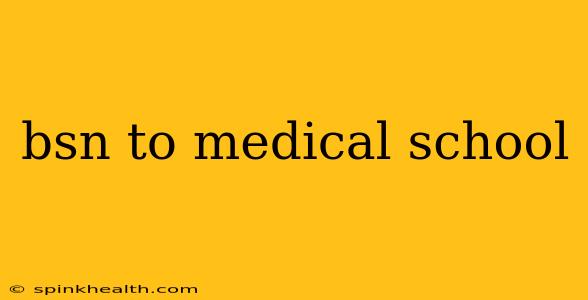The crisp white coat, the weight of responsibility, the unwavering dedication – the life of a physician is a powerful calling. For many, this dream begins long before the first day of medical school. For those holding a Bachelor of Science in Nursing (BSN), the path might seem clearer, but it's still a challenging and rewarding journey. This article will navigate the complexities of transitioning from a BSN to medical school, addressing common questions and offering insights into this unique path.
My own journey began with a deep-seated desire to help people. Nursing felt like the natural first step, allowing me to directly impact patients' lives. However, as I honed my clinical skills and witnessed the complexities of illness and treatment, I realized my aspirations extended beyond the bedside. The drive to understand the 'why' behind disease, to delve into the intricate workings of the human body, pushed me toward medical school.
What are the advantages of having a BSN before applying to medical school?
This is a question I frequently get asked, and the answer is multifaceted. A BSN offers several significant advantages:
-
Clinical Experience: The most obvious benefit is the extensive hands-on clinical experience gained during your nursing career. This practical knowledge sets you apart from other applicants who may only have limited shadowing or volunteer experience. Medical schools value this firsthand exposure to patient care. It's not just about knowing procedures; it's about understanding patient interactions, empathy, and the emotional toll of illness.
-
Strong Science Foundation: A BSN program provides a solid foundation in biology, chemistry, and anatomy – essential prerequisites for medical school. This strong scientific background can make the transition smoother and help you excel in your pre-med coursework.
-
Enhanced Application: The clinical experience and strong science background significantly strengthen your medical school application. Medical schools look for well-rounded candidates, and a BSN demonstrates commitment, resilience, and a deep understanding of the healthcare system.
-
Developed Professionalism: Nursing instills professionalism, teamwork, communication, and critical thinking skills, all highly valued in the medical field. You’ve already learned how to work effectively in a high-pressure environment.
What are the challenges of transitioning from a BSN to medical school?
While the advantages are significant, the transition isn't without its challenges:
-
Time Commitment: Balancing work as a registered nurse while simultaneously pursuing pre-med coursework requires incredible time management and dedication. It demands significant sacrifice and prioritization.
-
Competitive Application Process: Medical school admissions are intensely competitive. While a BSN offers advantages, you still need strong academic performance, high MCAT scores, and compelling personal statements.
-
Maintaining Work-Life Balance: The demands of both nursing and pre-med studies can lead to burnout. It’s crucial to prioritize self-care and maintain a healthy work-life balance.
What pre-med coursework is necessary after a BSN?
The specific requirements vary among medical schools, but generally, you'll need to complete courses such as:
- Organic Chemistry: A deep understanding of organic chemistry is crucial for medical studies.
- Physics: Physics is essential for understanding physiology and various medical technologies.
- Biology: Advanced biology courses build upon the foundation of your BSN.
- Biochemistry: This course provides a deeper understanding of the chemical processes in living organisms.
- General Chemistry: Often a prerequisite for organic chemistry.
It's crucial to check the specific prerequisites of the medical schools you intend to apply to.
How do I make my BSN experience stand out in my medical school application?
Highlighting your unique experiences as a nurse is key. In your personal statement, focus on:
- Specific patient interactions: Share impactful experiences that highlight your clinical judgment, problem-solving skills, and compassion.
- Leadership roles: Describe any leadership positions you held in nursing, demonstrating your teamwork and organizational abilities.
- Research involvement: If possible, participate in research to demonstrate your interest in scientific inquiry.
What if I don't have a strong GPA from my BSN program?
A lower GPA doesn't automatically disqualify you. Focus on demonstrating significant improvement in your pre-med coursework and highlighting your strong clinical experiences and other aspects of your application.
The path from BSN to medical school is arduous, but incredibly rewarding. It's a testament to your dedication, resilience, and unwavering commitment to a life of service. With careful planning, perseverance, and a compelling application, your dream of becoming a physician can become a reality. Remember to leverage your nursing background as a strength, highlighting the invaluable experience and insights you've gained. The journey is challenging, yes, but the destination is worth the effort.

